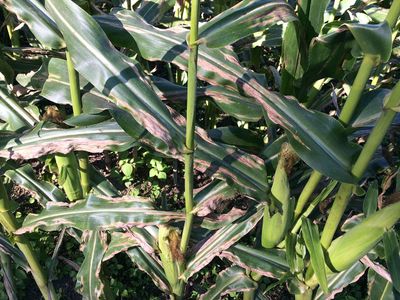Signs of Northern Corn Leaf Blight
Northern corn leaf blight is an infection caused by a fungus that is fairly common in the Midwest, wherever corn is grown. The disease generally only causes limited damage, but it may lead to crop loss under certain conditions. Some varieties of corn are more susceptible, and when the infection sets in early, losses are often greater. The characteristic sign of corn with northern leaf blight is the formation of lesions on the leaves. They are long, narrow lesions that eventually turn brown. The lesions may also form greyish colored borders around their edges. The lesions begin to form on lower leaves and spread to higher leaves as the disease progresses. During humid weather, the lesions may develop spores that make them look dirty or dusty.
Control of Northern Corn Leaf Blight
Control of this disease is often focused on management and prevention. First, choose corn varieties or hybrids that are resistant or at least have moderate resistance to northern corn leaf blight. When you grow corn, make sure it does not stay wet for long periods of time. The fungus that causes this infection needs between six and 18 hours of leaf wetness to develop. Plant corn with enough space for airflow and water in the morning so leaves can dry throughout the day. The fungus overwinters in plant material, so it is also important to manage infected plants. Tilling the corn into the soil is one strategy, but with a small garden it may make more sense to just remove and destroy the affected plants. Treating northern corn leaf blight involves using fungicides. For most home gardeners this step isn’t needed, but if you have a bad infection, you may want to try this chemical treatment. The infection usually begins around the time of silking, and this is when the fungicide should be applied.
